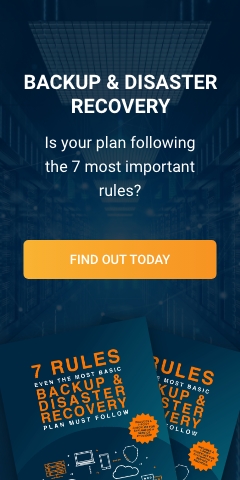All businesses today should have a disaster recovery (DR) plan. It protects an organization's critical business functions during a disaster and ensures that the company loses as little data as possible.
However, just having a plan is not enough to protect your business — you also have to make sure it works. This is where DR testing comes in.
What is DR testing?
DR testing is the process of verifying that a data disaster recovery plan works as intended. It examines all aspects of the DR plan, including the procedures, tools, and personnel involved in the recovery process.
There are three types of recovery testing. The first one, called the plan review, involves the DR plan developers and implementers closely examining the plan for any inconsistencies, errors, and incomplete components.
The second one is called a tabletop exercise. This process involves both the DR plan developers and the company's stakeholders carefully going through all the plan's steps. The goal is to clear up any misunderstandings and ensure that everyone is aware of their responsibilities and what they should do during emergencies.
Finally, the third type is a simulation. This is a comprehensive review in which the company stages a fake disaster and then proceeds to execute the DR plan as if the adverse event were really happening.
For instance, the company might simulate a cyberattack or sudden outage. The performance of data backups, redundant technologies, and personnel are then observed, and the time it took for the company to revert to operational status is noted.
Why is DR testing essential to businesses?
DR testing provides your organization with the following benefits:
1. It ensures that the plan meets the business's needs
Different companies have varying DR needs. For example, businesses in highly regulated industries, such as finance and healthcare, must adhere to specific compliance requirements. Needless to say, their DR plans have to be able to meet these legal mandates.
Additionally, certain companies cannot tolerate losing any data, while others can afford to lose some older data sets. As such, each organization has to tailor its DR plan according to its specific needs and priorities. By testing the plan, businesses can verify that it satisfies such distinct requirements.
2. It highlights weaknesses in the plan
A single flaw in the DR plan can result in the company losing access to their data, plenty of money, or the ability to do business altogether. Unfortunately, it's nearly impossible to develop a foolproof DR strategy on the first draft.
By continuously testing your DR plan, you can identify and fix any vulnerabilities before they cause actual damage. Testing also helps you detect outdated policies, tools, and processes, allowing you to replace them with updated and more effective ones.
3. It reduces human error
Even with the best policies and tools in place, your DR strategy can fail if your employees do not understand their roles. For example, if your team does not know how to use your company's data recovery tools, then you'll likely lose crucial files or be unable to access data for longer than you can afford.
Regular testing helps reduce the risk of people forgetting important steps in the plan and committing errors. Simulations, in particular, allow you to assess how well your employees understand the plan and what areas need further improvement.
4. It shortens downtime after actual disasters
Disasters can paralyze your company's operations, preventing you from serving your customers and earning revenue. Data reveals that 60% of outages cause $100,000 worth of financial losses. But apart from this, resulting downtime can also lead to reputational damage, data loss, and various legal penalties.
By ensuring that your DR plan is functional and optimized for your company's requirements, DR testing can help prevent lengthy downtime following disasters. Your business will be able to resume its normal operations sooner, limiting the disaster's negative effects.
Disaster recovery can spare your business from a significant amount of financial damage, and testing is the best way to guarantee that your DR plan will work when you need it the most.
If you need help developing and testing your DR plan, our IT experts at [company_short] will be more than glad to assist you. Contact us today to get started.


